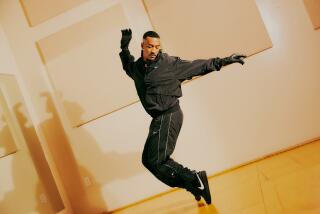Nigel Lythgoe ups the ante on ‘So You Think You Can Dance.’
ON a warm recent Saturday afternoon, a cold, dark soundstage was being prepared for a taping. Some 40 young dancers scampered nervously around, touching up their makeup, chatting quietly, stretching. Each was getting ready to face the most terrifying moment of his or her life.
The show is “So You Think You Can Dance” — a three-month-long dancing competition, similar in format to (and run by many of the people who bring you) “American Idol.” The episode they were shooting is called “The Green Mile,” named for the final yards a condemned prisoner walks to his execution. In a few hours, 20 would be on the road to dance stardom (or at least in the race for it) and 20 would find the door abruptly slammed in their faces.
Ready to roll, the contestants stood before the four judges who would decide their fates. The dancers giggled, their nervous energy on the brink of exploding. At the end of the table, the one person in the room wearing a jacket and tie, a Brit with shoulder-length blond hair, addressed them in a voice at once warm and absolutely authoritative.
“Good evening,” he opened, sounding a bit Hitchcockian. “We’ve looked at your tapes. Many of you are going to be disappointed. You may think we were wrong, but we’ve made our decision and we’re going to stick to it.” Moments later, they were led off the stage, heads down, the skip gone from their walk. The British man turned to the crew. “Did I frighten them?” he asked.
Of course he did, a bit. But the young dancers knew well that the occasional dose of high-voltage shock therapy was what they signed up for. And the speaker, Mr. Nigel Lythgoe, knows they know it too, because generating these shocks is how he spends his days, not just as judge of “So You Think You Can Dance” but also as an executive producer and co-creator (along with “Idol” warlord Simon Fuller). When not serving as judge and producer of “Dance,” Lythgoe, along with fellow executive producer Ken Warwick, presides over the daily production of another little TV franchise, a show called “American Idol.”
Soon, the dancers were summoned individually to a solitary walk through a series of spotlights. Looking frail and alone on the dark stage before the four imposing judges, some attempted to maintain a streetwise swagger. Others flashed nuclear-powered smiles at the table. It was an almost painfully raw spectacle to watch.
The first three in quick succession were, with a few words of consolation, handed the bad news. Lythgoe delivered the verdicts with a smooth but incontestable efficiency. There were no tears, no breakdowns, but their bodies told all: The rejected ones flew in but walked out. Those who made it through broke into leaps and twirls with an energy so infectious it filled the cavernous stage, eliciting huge smiles from judges and crew alike.
Finally, one walked in and Lythgoe had a bit more to say. A tall dancer in green socks faced the judges with a cocky expression. “We looked at your tapes,” Lythgoe said, “and we have a problem. You don’t communicate well.” Apparently in the interviews, the dancer was inarticulate and, worse, goofing off. “I hope you don’t think that dancing is going to get you through?” Lythgoe said, and assured him that while he is a talented dancer, his attitude would ruin him in the competition. Two minutes in, the swagger had completely vanished.
Soon Lythgoe dispatched him for a time of soul-searching. “I want you to go off and come back and tell me what you’re going to do and that you will conduct yourself in a manner befitting this program.” It was a bravura performance. Rarely does one witness a person so effectively stripped of his cockiness, and rarely can that moment be so perfectly captured on camera. And then the next victim was led in.
The Nigel Lythgoe universe is dotted with these points where people run into the most momentous moment in their life, and suddenly time slows and stretches out — their fate revealed only after the longest, most horrifying stare they will ever know. It is that moment of being called into the principal’s office and waiting to learn why, or sitting in front of the doctor while he fingers the folder containing your test results.
Perhaps unique among the titans of television, Lythgoe, along with Warwick, comes to the pinnacles of prime time from a background in dance. In his native England, Lythgoe began dancing at age 10, working with the Young Generation dance troupe before launching a career as a TV choreographer plotting the moves of, among other giants of entertainment, the Muppets. Eventually Lythgoe dived fully into TV production, joining Fuller’s 19 productions as chief executive in 2001, taking on among other duties a judging slot on the British forerunner of “American Idol,” “Pop Idol,” where he earned the nickname “Nasty Nigel” for his barbed reviews.
But in a way that makes one wonder why more shows don’t put dancers in charge, it is the choreographer’s sensibility that makes “American Idol” — let alone “Dance” — work, juggling tensions and building to crescendos in every episode and season.
If there is a simple explanation for what makes viewers stay with “American Idol” season after season, it is the spectacle of hidden tensions brought in the raw to the visible surface — people brought to a place where they can realize their greatest dream, stardom, or have their worst insecurities confirmed. And then the show holds that moment.
“We always say ‘light the blue touch paper,’ ” Lythgoe said, speaking in his office above the “American Idol” set several weeks before the “Green Mile” taping, “which nobody really understands in America because you’re not really allowed fireworks, but in England we have bonfire night and the kids get fireworks and the blue touch paper is like the firework and it says on it ‘Light blue touch paper: Stand back!’ That’s how we produce the show almost: Put elements in place that will bang up against each other. And then we stand back.”
As for his earlier decision to pull out as producer of one other mega-event — the Emmy Awards — “I thought about it over the weekend,” he said with a sigh. “I’ve got four more weeks of ‘Idol’ to produce. We just finished ‘Idol Gives Back,’ now we’re already preparing for the finals at the Kodak. Plus we’re shooting the first episodes of ‘Dance.’ And then there’s the band show Can you understand why my marriage is breaking up?”
Even in the “Idol” hub of world-conquering superachievers, the nimble, unflappable Brit stands out. In 2003, he suffered a heart attack while toiling in the “Idol” editing bays — and continued to work for two days.
Harvesting the drama
IT was the night that two contestants were to be eliminated from “Idol” after the amnesty granted during “Idol Gives Back” a week earlier. At 11 the previous night, Lythgoe received the most sought-after information in entertainment — who would be leaving the show.The results show is the true centerpiece of “Idol” stagecraft. Each week, the night after the performance show, Fox audiences return in still-dazzling numbers as the announcement of who lost the previous night’s vote is unveiled over the longest hour of the contestants’ lives.
“I say to them right at the beginning, ‘I’m going to mess around with you in the results show,’ ” he said. “I’m there to cause friction. I am there to annoy people or make people laugh or amuse people. That’s what the show is. We’ve got one hour to say, ‘So and so, you’re going home’ so we’ve got to move and manipulate it as much as we can. I always go out and apologize afterwards.”
A producer appeared in the doorway and soon after Lythgoe strolled into the chambre de secrets — the room where departing candidates’ farewell videos are edited. Unlike the open-door policy of the other bays, only three staffers are allowed in this room, and they discreetly waited until the door was closed before rolling tape. The identity of the fallen remains a secret until moments before airtime.
Noticeable throughout the day and across the production was a curious fact: Among people who must have some of the highest-pressure jobs in entertainment, there is a consistently pleasant tone in the air. One hears no screaming or lost tempers. The courtly Lythgoe doesn’t fail to compliment the crew after every viewing or rehearsal. “If it ever, ever, ever feels like hard work,” he explained, “I’ll lose my entire team. They work every hour God sends, so they’ve got to enjoy it. But the stress levels here are enormous. We do two live shows a week. And my energy levels are hugely high, but I’ve got to give them out to everybody on the team, not just keep myself going.”
A straight-shooter
ANOTHER shocking element of talking with Lythgoe is his constant and disarming non-defensiveness. In the world of high-stakes entertainment, where executives routinely pronounce themselves “thrilled” with catastrophic weekend grosses, Lythgoe’s unapologetic honesty is almost jarring. Among the quotes from one day in his company: Of the 500 songs reviewed for “Idol’s” songwriting competition by series creator Fuller, “I don’t think he liked any of them.”
“It’s only a game show. It’s not really a ritual slaughter. It is only a television talent show.”
“The characters for me were better last year” although, he continues, “I think the voices are better this year.”
But in fact it is this ruthless openness about their flaws that, in Lythgoe’s view, maintains the bond of trust between the show and its viewers. It is difficult to think of another show in recent history (perhaps ever) that has been so willing to expose its own controversies on the air. “I think what could hurt the show is if the integrity ever got lost,” he said. “You don’t turn your back on issues. We never turned our back on the issue when Paula [Abdul] was accused of a number of things. I believe in facing them. And denying them if they’re deniable. That’s what we do in England. If we ever take ourselves seriously, the whole thing will become so stupid. We can’t. If we don’t do things tongue in cheek with a smile on our faces, it’ll become very serious and then it becomes sad.”
An hour later, Lythgoe was on the set for the dress rehearsal of the results show. Stand-ins sat in the judges’ and contestants’ seats, and Lythgoe took center stage to walk through the show in the role of host Ryan Seacrest.
Stage manager Debbie Williams guided him through Seacrest’s lines. Lythgoe joked with the mock contestants, then said to Williams, “You know, I learned last week: Whoever is told they are staying, put them in the back, because otherwise they turn to look at the people behind them, and all we get is the back of Jordin’s head.” He was referring to the week before, when season winner Jordin Sparks, upon learning she had been saved, turned away from the camera.
As he proceeded to block out the show, staging the slow release of the results to fill up an hour with the maximum possible tension, Lythgoe’s dance background was perhaps most evident, making the results show seem like a ballet. Each week presents a different problem, a different set of expectations to play with. Lythgoe decided to bring out the contestants in two groups of three, dismissing one off the top and creating two buildups and crescendos. In the second group, he placed doomed contestant Chris Richardson onstage with Blake Lewis, who ultimately lost out to Sparks.
Later that night he explained, “It was only when we were halfway through onstage this morning that I realized they are the best of friends and by putting them together, they would support each other.” Which is exactly what occurred, delivering one of the most touching moments of the season when the pair awaited their fate together, each radiating only goodwill and affection toward his opponent.
Ultimately, it is this paradoxical sense of an exquisitely choreographed reality that makes the show, in its sixth season, continue to enthrall. As Lythgoe explained it, “The story line writes itself to a certain degree. We can play off it and we can do things to add to it, but I believe that the Sanjayas and the Chicken Littles and the Kellie Picklers and the Carrie Underwoods write themselves. That is, you know, the thing that happens. People making friends. The rudeness of some people. The arrogance of some people is all we show.
“And that is the beauty of our editors and our producers. They find it, they don’t write it. It’s there. Then the country takes over. Then we feel that vibration.”
*
richard.rushfield@latimes.com
More to Read
The biggest entertainment stories
Get our big stories about Hollywood, film, television, music, arts, culture and more right in your inbox as soon as they publish.
You may occasionally receive promotional content from the Los Angeles Times.






